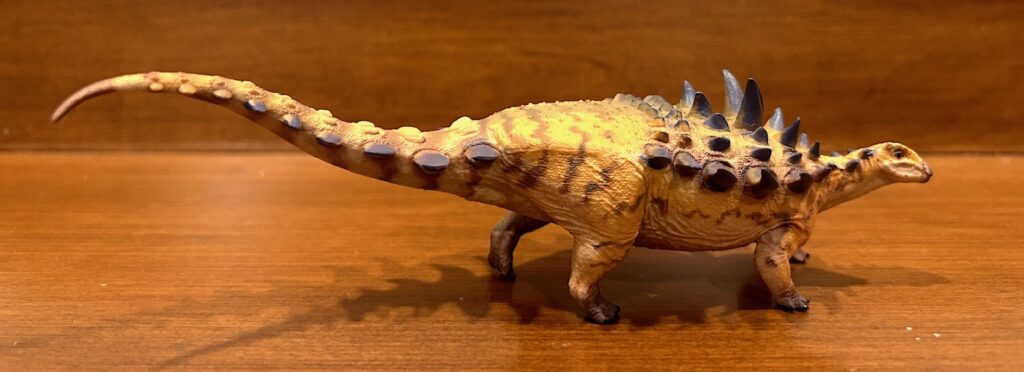
Gastonia was discovered in the Cedar Mountain Formation of Utah, USA. It lived during the Early Cretaceous period from 139 to 134.6 million years ago and is one of the very best known nodosaurids. Its name honours Robert Gaston, an American paleontologist and the CEO of Gaston Design, Inc., which makes and sells skeletal replicas of various dinosaurs and other prehistoric animals. Including Gastonia, of course!

Despite having a relative abundance of fossil material, Gastonia doesn’t have very many toys to its name. CollectA’s was the first one out the gates back in 2014. It was finally joined by Schleich’s in 2023. And for this year, we were lucky enough to get both this one from Haolonggood and another from Mattel. Oh, and we mustn’t forget that the late Dan LoRusso created one for the Battat Terra series, with the consultation of paleontologist Jim Kirkland, who is one of the top authorities on Gastonia. It was slated for release in 2015, but as most of you know, Battat chose instead for some reason to nix it along with Dan’s remaining sculpts. Curse them for doing that.

Anyhoo, this Gastonia is sculpted in an alert pose with its head raised, tilted to the left, and looking to the right. The left front limb is extended forward and the left hind one is in mid-step. Finally, the tail is raised high and swinging to the right. It certainly looks as though this individual has just caught sight of some potential danger approaching and is gearing up to valiantly defend itself. From its beak to its tail tip, it measures about 17.5 cm long. It is also 4.5 cm wide at the midsection, which makes it look quite thick when viewed from the front or from behind.


This is the “Tang Long” version, the other being “Du Xin.” Its main colours are yellow-orange on top and very pale orange on the underbelly. The feet are medium brown with black claws. Brown stripes run down the sides, the pelvis, and the tail and there is a large splash of faint blue on the back. The head features bright blue eyes and a dark brown beak. Finally, the spikes and osteoderms on the neck and front section of the torso and the spikes on the tail are dark blue. While it is an attractive colour scheme, I would be lying if I said that the blue had been applied nice and neatly. On the contrary, many of the spikes look sloppy and unfinished, and the very smallest spikes on the tail have no blue on them at all. Also, it strikes me as odd that the keeled osteoderms on the tail weren’t painted blue as well. I have no idea if this is a common problem or a case of individual bad luck, so please leave a comment if your Gastonia has better painted spikes than this.


Fortunately, I can’t complain about the sculpting job here. Like all the other Haolonggood dinosaurs I’ve acquired thus far, the musculature and the pebbled and wrinkled skin on this one have been done with painstaking precision. The same goes for all the armour, and the tips of the spikes are so pointy that you need to be careful when handling the toy. Unlike the CollectA and Schleich ones, this Gastonia is definitely not suitable for younger children to play with.

The Gastonia‘s head is roughly triangular in shape with no armour on the snout, but visible small plates over the orbits. The squamosal and jugal horns appear undersized, so much so in the case of the latter that I thought they were completely absent at first. The fifth digits on the front feet are similarly miniscule, and their lack of claws makes them even harder to detect at first.

Sharp, curved, and progressively larger spikes jut out from the sides of the neck and front torso. Four pairs of similar spikes, positioned closely together, are running down the middle of the back. Surrounding them are rows of smaller keeled scutes.

Next we come to the sacral shield, which is covered in lots of tiny round scutes. Finally, the tail is protected by two rows of scutes running along the top and more curved spikes along the sides.

The overall result is a most formidable-looking armoured beast. It is difficult to envision these defenses being overcome by even the most famished Utahraptor, which so far is the biggest predatory theropod known from the Cedar Mountain Formation.

So how accurate is this Gastonia? Well, it appears to have carefully if not 100% accurately followed the reconstruction by paleoartist Gregory S. Paul for his Princeton Field Guide to Dinosaurs. However, a more recent one by Jim Kirkland has spikes running along either side of the sacral shield. I therefore asked both Kirkland and fellow renowned paleontologist Kenneth Carpenter what they thought of this toy. They both responded that they felt that there really ought to be spikes along the sides of the sacral shield and that the shield itself ought to be way more elaborate and bumpy, like on the CollectA version. However, Carpenter also emphasized that any reconstruction is still guesswork when it comes down to it, as all Gastonia specimens are from bone beds where all the bits of armour are mixed up. And Kirkland for his part really likes this toy in spite of what he considers to be its flaws.


With its meticulous sculpting detail and pleasingly prickly appearance and feel, the Haolonggood Gastonia is a pretty impressive toy. The paint flaws are a downer, but again, hopefully you’ll have better luck than me. And as for accuracy, again, we can’t be 100% certain how the animal’s armour really was arranged in life, although the sacral shield definitely could have been beefed up more. Overall, not the best ankylosaur Haolonggood’s done, but still worth picking up.

Disclaimer: links to Ebay and Amazon on the DinoToyBlog are affiliate links, so we make a small commission if you use them. Thanks for supporting us!
Trending Products











